A couple of weeks ago we held an informal event for researchers to share their experiences and knowledge of working with research data.
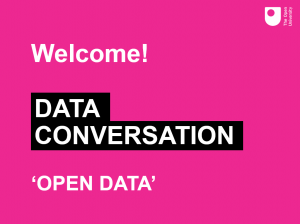 The idea was to hear from researchers about how they work and what’s important to them, away from the (valuable but not always so exciting) talk about complying with funder policies and writing data management plans. We hoped this would start some conversations and potentially help build a community around research data management at the OU.
The idea was to hear from researchers about how they work and what’s important to them, away from the (valuable but not always so exciting) talk about complying with funder policies and writing data management plans. We hoped this would start some conversations and potentially help build a community around research data management at the OU.
If that sounds familiar it could be because it’s something Lancaster University have been doing very successfully for a while. The suggestion to plan a similar event at the OU came from talking with our friends at Figshare (the repository our research data repository, ORDO, uses), in particular Megan, who also gave us lots of help before and during the event. So, with thanks, we pinched Lancaster’s idea and even the name ‘Data Conversation’.
We had a theme of ‘open data’ and invited OU researchers to come along to talk on that topic for about 15 minutes – and were delighted to have a brilliant line-up of talks.
Our speakers
David King – a Visiting Fellow in Computing & Communications, David talked about the history of his work with biodiversity and agriculture data, and the many systems he has used to manage and share information. We heard how technologies and tools like DOIs, institutional repositories (hello ORO and ORDO!), and collaborative document management like Office365 can help to work with and share research data. David also touched upon his joint research in the Humanities with Francesca Benatti on the A Question of Style project. You can see David and Francesca’s slides here.
Sarah Middle – Sarah’s a PhD student studying Digital Humanities/Classical Studies, and talked about her PhD in using linked data in Ancient World research. Through examples of Sarah’s work linking UK Arts and Humanities project data, and working with the British Library on Privy Council appeals data, we saw how openly available data can be re-used. However, re-using that data can require a lot of work to make it usable in a new format, and to be sure if, and how, it can be shared further. Sarah also took us through the process she has gone through to ensure the data she collects from surveys and interviews can be as open as possible, by working with the OU’s ethics committee and library research support.
Nancy Pontika – Nancy is Open Access Aggregation Officer at CORE, (the Open Access repository based in the OU’s Knowledge Media Institute), and told us about the work CORE does to provide research publications to anyone, anywhere, by harvesting content from open access repositories. CORE has over 135 million metadata records and 11 million full text items and makes its API and dataset open for others to use freely. We also heard about the development of the upcoming analytics dashboard, for institutions to assess the impact of their research outputs. You can see Nancy’s slides here.
Tony Hirst – A Senior Lecturer in Telematics, Tony gave us a whirlwind tour of the many ways he has used open data to answer topical questions, or really to investigate anything that he finds of interest (including the companies connected to Iron Maiden). It was a great demonstration of how an inquisitive and playful approach can produce novel information by combining freely available datasets. You can find many examples of Tony’s work in these links, and generally on his blog OUseful.Info. Tony had delivered an earlier session for the library team here at the OU, about how virtual machines and Jupyter notebooks can be used in teaching and research data sharing, which really piqued our interest too.
Discussion
Along to hear the talks and join the discussion were a mix of researchers, research support staff and librarians. After the talks and follow up discussion we had some round table discussions on ‘open data’ topics:
- What most interests you about sharing your data openly?
- What might prevent you from sharing your data?
- Where might you go (or have you gone) for support on sharing your data?
- Where might you look to deposit your data, and why?
These images show the ideas we captured (click on them to see in detail):
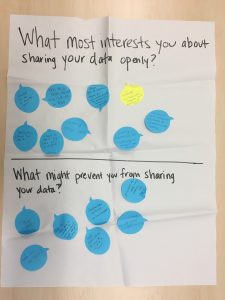
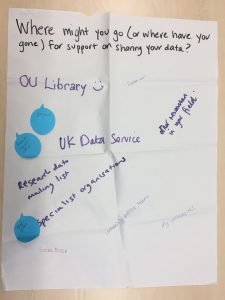
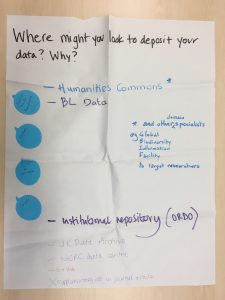
From all of this some themes emerged:
- Making data ‘open’ can be a tricky thing to do. Echoing what we often find when working with researchers – that working out where to put it, how to organise and describe it, and whether it is indeed ok to share it (e.g. for personal or otherwise sensitive data) takes time and effort. Then actually doing it takes time too.
- There are lots of resources and people to go to for support and advice. This is great and shows a commitment from funders, institutions and, most importantly, researchers to work openly. Is there a risk that that it can be hard to pick your way through to the relevant information you need? Possibly.
- Is it intrinsic or something extra? For some, data sharing is part of their work (See our speakers for example). For others it is seen as an extra task to do at the end of a project or when publishing.
- There doesn’t have to be one ‘right way’. In the talks we heard positive examples of data being shared and used in a variety of ways. Things like ORCID, DOIs and metadata standards can help identify and link data consistently, but beyond that we don’t all have to use the same methods and systems.
- It is well worth doing. We were to an extent preaching to the choir, but the mood in the room was that it is certainly well worth doing. Our speakers illustrated a variety of uses and approaches where open data enables and supports research, and the comments we noted for ‘What most interests you about sharing your data openly?’ highlighted benefits for data authors, data re-users, research participants and for generally improving research.
How can we help?
So what can we, as a library, do?
- We can continue to provide the tools and systems to store, preserve and share research data.
- We can support researchers in using them – and when they do, we can help promote and connect the data and other outputs they share.
- We can continue to provide advocacy, training and advice on data sharing to make researchers aware and prepared to share when planning their work.
- We can also continue to listen and have conversations with researchers about what they are doing, their priorities, and what would help them to do it.
Next Steps?
We’d love to have another Data Conversation in the new year on a new topic. If you’d like to take part – either to speak about your work or join to hear what others have been up to – please get in touch library-research-support@open.ac.uk
And thanks again to everyone who came along!
Written by Dan Crane, Research Support Librarian.
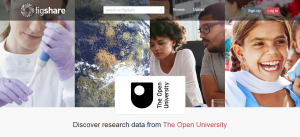 Did you know, on the first Thursday of every month between 14.00 and 15.00 we run an online drop-in for ORDO, our research data repository?
Did you know, on the first Thursday of every month between 14.00 and 15.00 we run an online drop-in for ORDO, our research data repository?


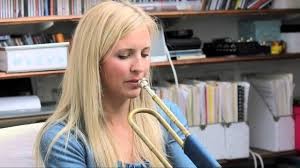

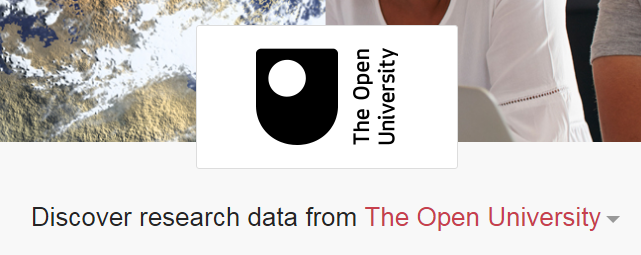
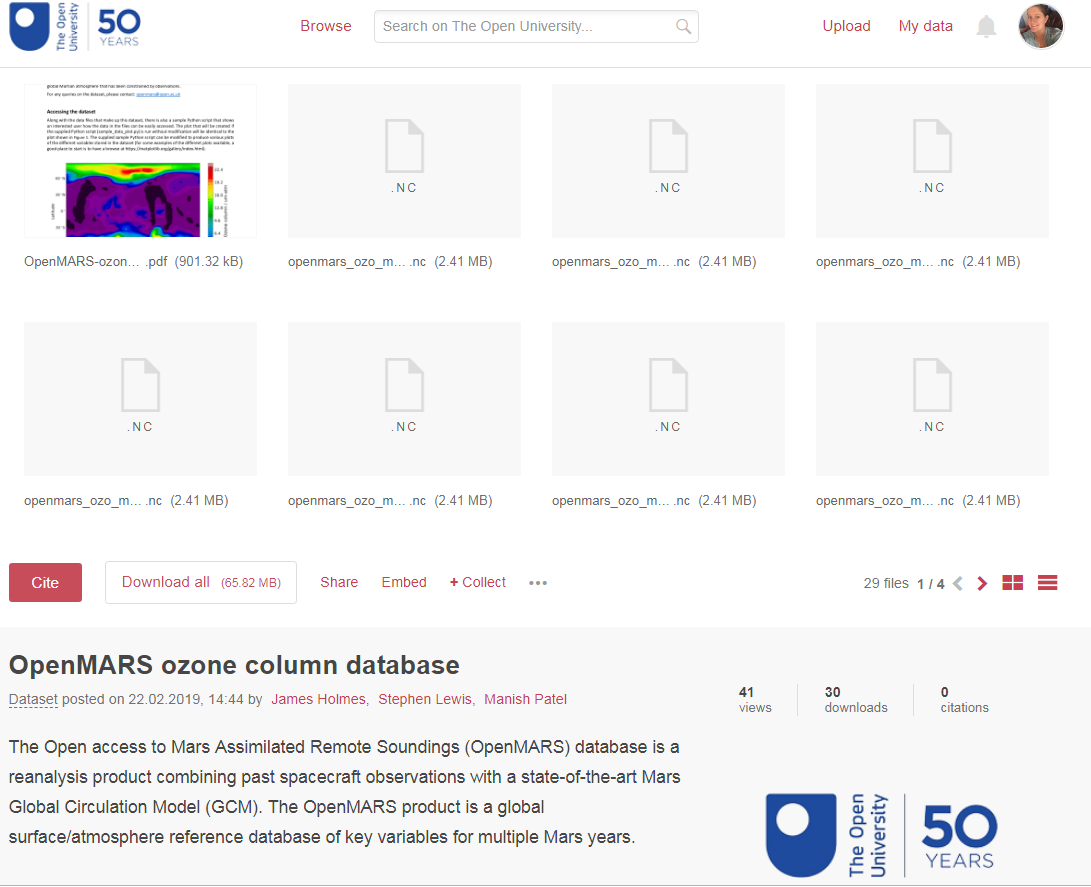 There are four datasets which are published individually and also grouped together as a collection. The most impressive thing about these is the documentation accompanying these datasets, which is excellent:
There are four datasets which are published individually and also grouped together as a collection. The most impressive thing about these is the documentation accompanying these datasets, which is excellent:





